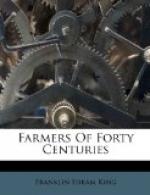China, with her already overtaxed fields, can ill afford to give over an acre to the cultivation of this crop and she should prohibit the growing of tobacco as she has that of the poppy. Let her take the wise step now when she readily may, for all civilized nations will ultimately be compelled to adopt such a measure. The United States in 1902 had more than a million acres growing tobacco, and harvested 821,000,000 pounds of leaf. This leaf depleted those soils to the extent of more than twenty eight million pounds of nitrogen, twenty-nine million pounds of potassium and nearly two and a half million pounds of phosphorus, all so irrecoverably lost that even China, with her remarkable skill in saving and her infinite patience with little things, could not recover them for her soils. On a like area of field might as readily be grown twenty million bushels of wheat and if the twelve hundred million pounds of grain were all exported it would deplete the soil less than the tobacco crop in everything but phosphorus, and in this about the same. Used at home, China would return it all to one or another field. The home consumption of tobacco in the United States averaged seven pounds per capita in 1902. A like consumption for China’s four hundred millions would call for 2800 million pounds of leaf. If she grew it on her fields two million acres would not suffice. Her soils would be proportionately depleted and she would be short forty million bushels of wheat; but if China continues to import her tobacco the vast sum expended can neither fertilize her fields nor feed, clothe or educate her people, yet a like sum expended in the importation of wheat would feed her hungry and enrich her soils.
In the matter of conservation of national resources here is one of the greatest opportunities open to all civilized nations. What might not be done in the United States with a fund of $57,000,000 annually, the market price of the raw tobacco leaf, and the land, the labor and the capital expended in getting the product to the men who puff, breathe and perspire the noxious product into the air everyone must breathe, and who bespatter the streets, sidewalks, the floor of every public place and conveyance, and befoul the million spittoons, smoking rooms and smoking cars, all unnecessary and should be uncalled for, but whose installation and up-keep the non-user as well as the user is forced to pay, and this in a country of, for and by the people. This costly, filthy, selfish tobacco habit should be outgrown. Let it begin in every new home, where the mother helps the father in refusing to set the example, and let its indulgence be absolutely prohibited to everyone while in public school and to all in educational institutions.




